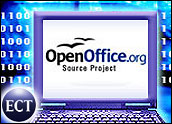
IBM has announced that it is moving closer than it has ever been to the OpenOffice.org community with stepped-up support in its Lotus product line of collaborative software and a commitment to contribute code.
The announcement suggests a win-win for IBM and OpenOffice.org, a seven-year-old project created by Sun Microsystems and widely recognized as the open source contender to proprietary office software.
“With downloads of more than 100 million, this is the first real competitive grassroots office productivity suite that rivals proprietary alternatives,” Sun spokesperson Terri Molini told LinuxInsider.
Code Contributions
That IBM is to contribute code marks a departure from 2005, when IBM took source code from OpenOffice to build parts of its Workplace, but did not contribute back.
“The community always wants work to be contributed back to the source, and so we are all the happier that IBM announced their interest in doing so,” Louis Suarez-Potts, OpenOffice.org community manager, told LinuxInsider.
Software Engineering
News that IBM will both contribute to and actively use OpenOffice.org components adds muscle to both sides’ technologies, said John McCreesh, OpenOffice.org marketing project lead. “IBM contributing code strengthens the OpenOffice.org product; IBM using OpenOffice.org components strengthens OpenOffice.org’s reputation for high-quality software engineering. We value them both,” he said.
Wording of the announcement’s headline said IBM will “promote” OpenOffice.org. IBM declined to cite specifics on promotion specifics when reached by LinuxInsider, however.
That information is to come in the form of announcements in New York next week at the Lotus Collaboration Summit, according to IBM spokesperson Michael Azzi.
ODF Momentum
What is already clear is that the IBM move will have ramifications on continued momentum building toward Open Document Format (ODF), versus the Microsoft-backed Office Open XML (OOXML) standard.
OpenOffice uses ODF as its native file format, a format that has been accepted by the International Organization for Standardization (ISO) as an international standard. Microsoft Open XML failed to win enough initial support last week in becoming an ISO standard.
Don’t read too much into this, cautioned Suarez-Potts. “OpenOffice.org is not by any means the only supporter or implementation of the ODF,” he said Monday. “One can number KOffice and many others, including Alfresco, proprietary and not, committed to the format.”
What it does mean, he said, is that “its most important implementation should be taken very seriously by enterprises and governments and considered the real future of office documents.”
An Important Step
Likewise, Sun’s Molini said the Monday announcement can be considered as an “important step” for ODF rather than a new chapter. “This is an important step in the adoption of ODF as a dominant document format but not a new chapter. The new chapter was opened with the adoption of ODF by ISO as an International Standard,” Molini said.
Having a behemoth the likes of IBM throwing its weight behind the ODF certainly can’t hurt, said McCreesh of OpenOffice.org.
“The world needs one standard for office files. ODF is already established as an ISO standard and has been adopted in a growing number of products,” McCreesh added. “What the technology world needs now is for Microsoft to rally behind the ODF standard, too.”
Government Needs
IBM will contribute code from Lotus Notes to improve current support for “accessibility enhancements” to make sure the ODF format accommodates people with handicaps.
“Accessibility is required if you want to do business with the government,” Azzi said. “IBM has a long track record of innovation in the arena of corporate and even consumer accessibility.”
“Accessibility technology is vastly important to governments, which ideally must serve all the people, not just the few,” said Suarez-Potts. “I’d imagine that OpenOffice.org and the ODF will rocket to attention.”



















































